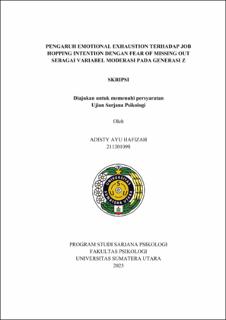| dc.description.abstract | In recent years, the presence of Generation Z in the workforce has brought significant changes to employment dynamics. This generation is known for being flexible, ambitious, and digitally connected, yet also demonstrates a higher tendency to change jobs compared to previous generations. One factor influencing this phenomenon is emotional exhaustion. In the psychological context of digital-native employees, the fear of missing out (FoMO) is also suspected to play a crucial role in strengthening the tendency toward job hopping intention. This study aims to examine the effect of emotional exhaustion on job hopping intention, as well as to investigate whether fear of missing out moderates and strengthens this relationship among Generation Z employees in Indonesia. A quantitative approach was employed using an online survey and Moderated Regression Analysis (MRA). Data were collected from 404 participants aged 19–30 years across six major islands in Indonesia, utilizing three measurement scales: emotional exhaustion, job hopping intention, and fear of missing out. The results indicate that emotional exhaustion significantly influences job hopping intention, and fear of missing out significantly moderates this relationship by strengthening its effect. These findings highlight the importance for organizations to address emotional exhaustion and the dynamics of fear of missing out among young employees in order to reduce job-hopping tendencies. | en_US |


